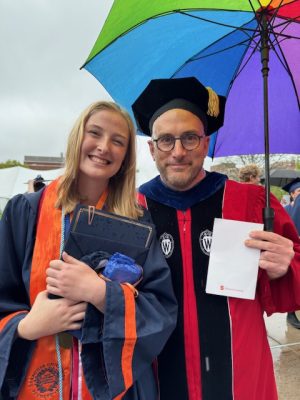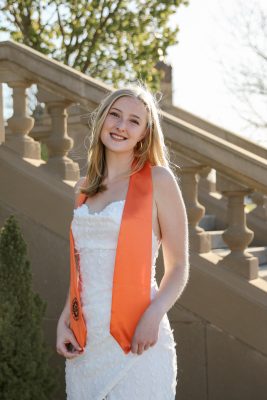When the latest national trend toward challenging children’s books in community and school libraries came to her small Western Pennsylvania town, Morgan Meddings ’25 was shocked and dismayed, but not intimidated.

An honors student and inclusive elementary major, Meddings channeled her energy into developing a school curriculum designed to defend challenged books.
This project was eventually submitted as her honors thesis, and in May 2025 the Renée Crown University Honors Program announced that her paper—”Censorship in US Schools: How to Teach Banned Books”—had won the David Orlin Prize for Overall Outstanding Thesis Project. This is the second year in a row that a Syracuse University School of Education student has taken home this coveted prize, after Disability Studies minor graduate Alexis Wilner ’24.
Chilling Effect
Currently a substitute teacher at Meachem Elementary School in the Syracuse City School District, where she took her final student teacher placement before graduating, while a college student Meddings worked for several summers at Peters Township Public Library in Washington County, PA, about 20 minutes from Pittsburgh.
“I had noticed that community members were becoming much more vocal during the COVID-19 pandemic,” says Meddings. “With all this tension going on, I got an internship at my library in 2021.” Then, in summer 2022, a patron tried to have a book on gender identity removed: “That is something I never considered would happen in my community.”
In fact, Meddings recalls that day clearly: “I came into work in the children’s library the day the request happened. When I joined my colleagues in the staff room, the mood was tense.”
The patron had requested removal of It Feels Good to Be Yourself. “This is a basic vocabulary picture book aimed at second or third graders that we had on display,” Meddings explains. “The patron filled out a request for reconsideration and submitted it to the library. The library’s internal decision to keep the book was then appealed to the municipality, which ultimately ruled in our favor.”
Although the official outcome kept the book on the shelves, the incident had a chilling effect: “It happened just before Pride Month in June, when we would normally create Pride displays for the entire children’s section. That year, we only displayed LGBTQ+ books in the young adult section.”
“I want [my curriculum] to be a resource for other teachers who might feel intimated by the current climate surrounding education.”
Popular Targets
“This incident lit a fire in her,” says Professor George Theoharis, Meddings’ honors advisor. “Morgan was outraged about the damage book banning can do. Even though the book was ultimately not removed, her library worried about and chose to not display other books about race and LGBTQ+ issues to avoid community conflict.”
In another incident, Meddings encountered a patron who at first asked for all the resources the children’s library had on LGBTQ+ issues. “I asked what topics in particular, and he said, ‘anything you have,'” Meddings recounts. When she put a pile of books and resources on a table for him, he left them and walked away, “leaving us to wonder whether this was an innocent request or something riskier.”
“For her honors thesis,” continues Theoharis, “Morgan decided she needed to learn more about the issue of book banning, so she studied and researched its history in the US, as well as in this contemporary era.”
Meddings explored the issue decade by decade, starting in the 1920s when On the Origin of Species was singled out as a result of the 1925 so-called Scopes Monkey Trial, which addressed a Tennessee law banning the teaching of evolution in public schools. James Joyce’s Ulysses was a favorite object for censorship in the 1930s and 1940s, followed by books about Robin Hood in the 1950s McCarthyite era, mostly because this altruistic outlaw and his Merry Men appeared to promote Communism.
Moral panic then turned to writings about integration during the 1960s Civil Rights era, such as The Rabbit’s Wedding, a charming book about one black and one white bunny who fall in love. Next, author Judy Blume came under scrutiny in the 1970s and 1980s when ire turned toward works that supported sexual education.
“Gender, sex, and race are targeted frequently,” observes Meddings. “I learned that Are You There God? It’s Me, Margaret is a highly targeted book, and much of Blume’s work is targeted because she frequently writes about sexual health, something about which pre-teens should have a positive view.”
A Resource for Others

A major theme of contemporary book ban efforts is challenging anything that appears to promote Critical Race Theory (CRT), or—given that small children are unlikely to engage in graduate-level academic discourse—works that teach about race relations in general.
“There is current federal and local legislation against teaching CRT, especially surrounding the 1619 Project and its children’s book, The 1619 Project: Born on the Water, because these resources are seen as popularizing CRT,” says Meddings. “The federal government has even created the 1776 Commission in response. It’s crazy how overt they are being in what they are targeting.”
After doing her research, Meddings set about creating a curriculum to help educators both teach and defend banned and censored books. As Theoharis explains, “Morgan selected five picture books that are frequently challenged, and as part of her honors thesis, she described the book and planned a detailed lesson differentiated for a range of learners that aligns with important New York State content standards.”
Morgan Meddings’ Five Challenged Books
- And Tango Makes Three by Justin Richardson, Peter Parnell, and Henry Cole (Little Simon, 2005)
- It’s Okay To Be Different by Todd Parr (Little, Brown, 2009) (“This is the first book I was gifted as a child, and it is my reference as to what a book should do for kids: offer inclusivity and joy.”)
- I Am Enough by Grace Byers (HarperCollins, 2018)
- It Feels Good to Be Yourself: A Book About Gender Identity by Theresa Thorn and Noah Grigni (Henry Holt, 2019)
- The 1619 Project: Born on the Water by Nikole Hannah-Jones, Renée Watson, and Nikkolas Smith (2021)
“In each plan, I also include a rationale that can be shared with, say, a school board as to why the particular book is good academically and why children should read it, based on skills it emphasizes for young people, such as empathy or critical thinking,” Meddings adds.
Ultimately, Meddings says, this project has fueled her passion for literacy: “I definitely see myself working as a classroom teacher while some day getting a master’s in literacy or library science.”
In fall 2025, she will be taking her love of books and ideas about literacy with her on a Fulbright Scholarship to Madagascar, where she will be teaching English to young people while polishing her second language, French.
As for the curriculum, Meddings hopes to publish it one day: “I didn’t write it just for me. I want it to be a resource for other teachers who might feel intimidated by the current climate surrounding education.”
